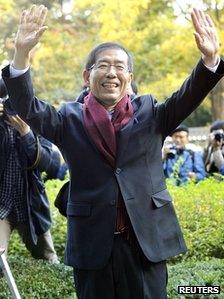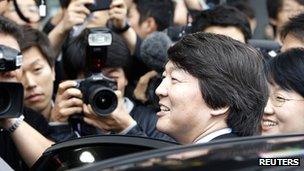Seoul mayor Park Won-soon shakes up S Korean politics
- Published

Park Won-soon represents a new kind of politics in South Korea
South Korea's political parties are looking distinctly nervous these days.
The governing conservative Grand National Party (GNP) has said it wants to re-invent itself as a party of "digital nomads" to better listen to the people.
Its main opposition, the Democratic Party (DP), is talking about a "wave of social change" and looking at forming a wider alliance to strengthen its position.
And the reason for all this nervousness? A bespectacled civic activist called Park Won-soon. Or, as he is now known: the mayor of Seoul.
Mr Park won the election for mayor last month, without any previous experience as a politician, and without joining any of South Korea's political parties.
A generation after democracy emerged here, his win is being described by analysts as a "sea change" in South Korean politics.
The elevation of an independent candidate to the second-most powerful job in the country would be a wake-up call at the best of times, but this has come just as South Korea is gearing up for national parliamentary and presidential elections next year.
And if the reality of an independent mayor is a shock, the dimly-glimpsed prospect of an independent president is sending shivers through the main parties.
Added to which, the newly-elected Mr Park is not a man to keep his criticism of the political establishment to himself.
At a briefing for journalists this month, he spoke frankly about South Korea's battle with its US Free Trade Agreement, and about the best approach to take with North Korea.
He also said his conservative mayoral predecessors - one of whom is now South Korea's president - had used their positions to climb the political career ladder and "did not listen" to the people.
The idea that politicians here have stopped listening is a common one. And it is not only directed at the governing GNP.
Mr Park beat the GNP candidate on election day itself, but he also beat the opposition party candidates in a primary race beforehand - a decision in which voters and opinion polls played a strong role.
'New politics'
Woo Jung-yeop, a research fellow with South Korea's Asan Institute for Policy Studies, says that while the mayoral election may have frightened the GNP, it has also has posed a real problem for the opposition - how to benefit from the surge in voter support for left-wing outsiders.
"The Democratic Party wants to be centre-left, but the others want clearer ideology in economics and relations with North Korea. It will be very interesting to see how the DP will react to that pressure," he says.
Some trace this disillusionment to the kind of welfare-focused policies being highlighted by Park Won-soon and his allies in civic activism.
The gap between rich and poor is widening in South Korea, say analysts, and politicians sometimes appear torn between the big conglomerates who provide the backbone of the economy and the voters - many of whom feel they are losing out on the returns.
But others believe the problem is much wider.
A survey carried out by some of South Korea's main media outlets the day after Mr Park's win found a third of those polled said they believed South Koreans wanted "a new kind of politics" entirely.
Seoul-based commentator Tom Coyner, writing in the JoongAng Daily newspaper, concluded "the populist desire for change is undeniable".
People are "sick and tired of traditional politics", he said, both the conservatives and the progressives.
'Obama moment'?

Ahn Cheol-soo also captured the public imagination in the run-up to the mayoral campaign
At least, those under 50 seem to feel that way. Opinion polls suggest Park Won-soon was carried to the mayor's office on a wave of support from younger South Koreans.
His campaign funding was made up largely of small donations made online, and exit polls point to those in their 20s and 30s as his biggest supporters.
And he is not the only newcomer to have grabbed the political spotlight. One of his key supporters during the race was Ahn Cheol-soo, a professor and IT businessman who captured the public imagination in the run-up to the campaign - but who refused, in the end, to run himself.
Which means he is, theoretically at least, available for the presidential race next year. And that is leaving aside the question of who else might emerge from outside the political establishment between now and the start of campaign season.
So will 2012 be South Korea's "Obama moment" - an election where young people, social media and a desire for change carry someone different to the top job?
Mike Breen, a resident and analyst of South Korea for over 20 years, says this political disillusionment is not as new as it appears - and runs a lot deeper.
"It tells you something about the [South] Korean voting public that this is a country where people don't like their leaders; they don't like their politicians," he said.
"They yearn for the perfect outsider, but are often disappointed once he or she is in power. Mr Park will fall victim to this himself eventually."
Political legacy
The problem, Mike Breen believes, is that Korea's democratic leaders have a tough act to follow, in the shape of South Korea's autocratic second president, Park Chung-hee.
"Park Chung-hee is still the model with which leaders are compared. He was a dictator, who could do virtually what he wanted; he had a poor country to start with - which he built up and gave everyone jobs; and he had 18 years in which to do it."
By comparison, politicians now have a harder time, he says.
"Now South Korea is already a democracy, it's already developed, and you have only five years as president, with your hands tied behind your back - how do you replicate what Park Chung-hee achieved?"
That is as big a dilemma for independents as it is for party politicians.
But here is another: the voting public also appear rather divided on the issue of activists entering the political scene.
Park Won-soon may have won the race for mayor, says Dr Woo Jung-yeop, "and Ahn Cheol-soo may still be polling a front-runner for president, but according to a recent survey, 50% of [South] Koreans believe activists should remain as 'referees' of the political scene, not become players".
This is one small glimmer of hope as South Korea's political veterans prepare for the starting whistle.
- Published24 October 2011
- Published30 September 2011
- Published3 June 2010